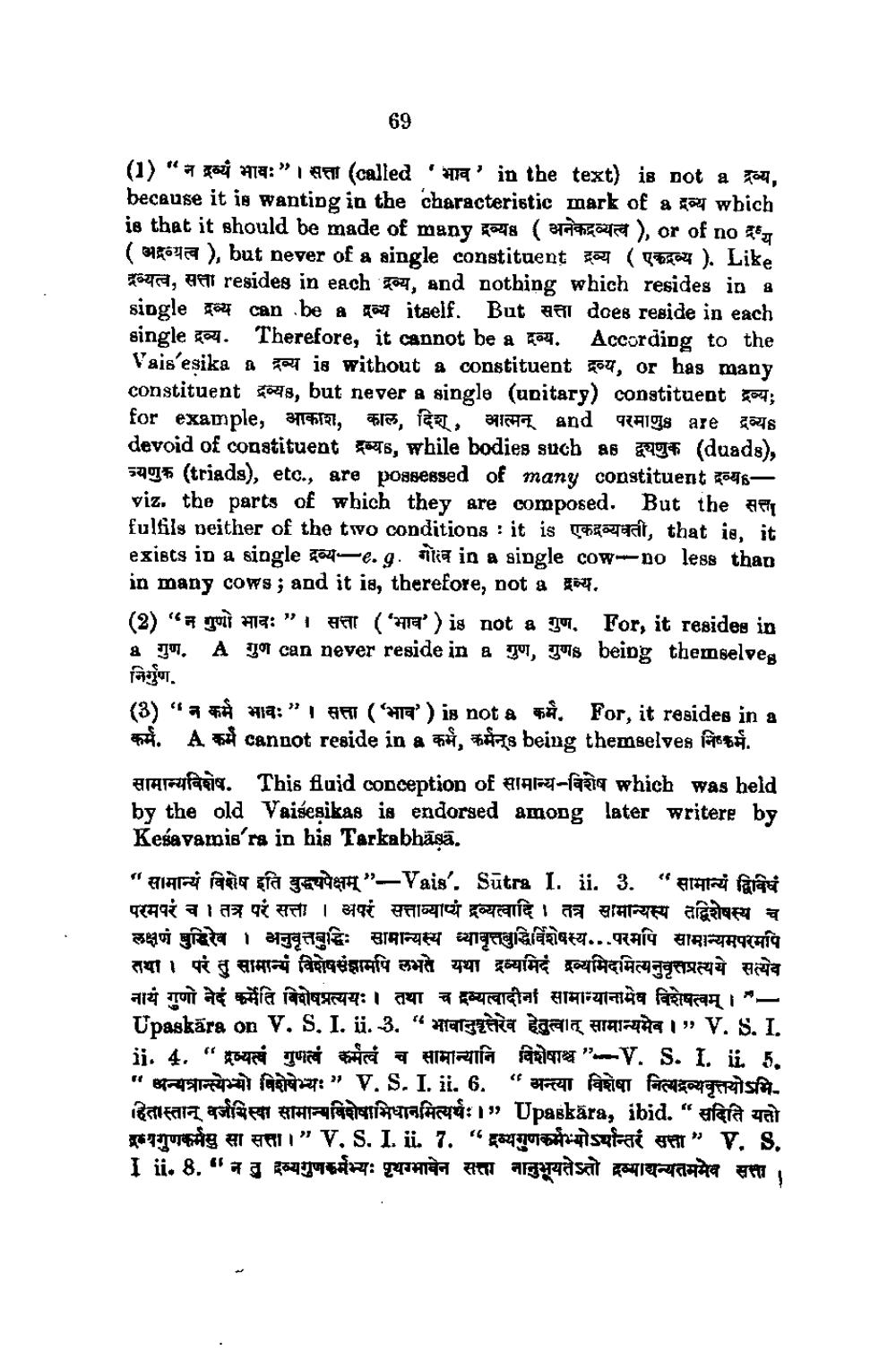________________
69
(1) "न द्रव्य भावः"। सत्ता (called 'भाव' in the text) is not a द्रव्य, because it is wanting in the characteristic mark of a su wbich is that it should be made of many द्रव्य ( अनेकद्रव्यत्व ), or of no द्रष्य (अद्रव्यत्व), but never of a single constituent द्रव्य (एकद्रव्य ). Like द्रव्यत्व, सत्ता resides in each द्रव्य, and nothing which resides in a siogle can be a day itself. But an does reside in each single 24. Therefore, it cannot be a 104. According to the Vais'esika a tag is without a constituent 464, or has many constituent द्रव्यs, but never a single (unitary) constituent द्रव्य for example, आकाश, काल, दिश् , आत्मन् and परमाणुs are द्रव्य devoid of constituent द्रव्यs, while bodies such as द्वयणुक (duads), ज्यणुक (triads), etc., are possessed of many constituent द्रव्य:
viz. the parts of which they are composed. But the सत्ता fulfils neither of the two conditions : it is एकद्रव्यवती, that is, it exists in a single sotme.g. sia in a single cow po less than in many cows; and it is, therefore, not a न्य. (2) “न गुणो भावः"। सत्ता ('भाव') is not a गुण. For, it resides in ३ गुण. A गुण can never reside in a गुण, गुणs being themselves निर्गुण. (3) "न कर्म भावः" । सत्ता ('भाव') is not a कर्म. For, it resides in a कर्म. A कम cannot reside in a कर्म, कर्मन्s being themselves निष्कर्म. सामान्यविशेष. This fiuid conception of सामान्य-विशेष which was held by the old Vaiseşikas is endorsed among later writere by Kesavamisra in his Tarkabhasa. " सामान्यं विशेष इति बुद्धयपेक्षम् "-Vais'. Sutra I. ii. 3. “सामान्यं द्विविध परमपरं च । तत्र परं सत्ता । अपरं सत्ताव्याप्यं द्रव्यत्वादि । तत्र सामान्यस्य तद्विशेषस्य च लक्षणं खुद्धिरेव । अनुवृत्तबुद्धिः सामान्यस्य च्यावृत्तबुद्धिर्विशेषस्य...परमपि सामान्यमपरमपि तथा । परं तु सामान्य विशेषज्ञामपि लभते यथा द्रव्यमिदं द्रव्यमिदमित्यनुवृतप्रत्यये सत्येव नायं गुणो नेदं कर्मेति विवोषप्रत्ययः। तथा च द्रव्यत्वादीनां सामान्यानामेव विशेषत्वम् ।Upaskāra on V. S. I. ii. 3. “ भावानुवृत्तरेव हेतुत्वात् सामान्यमेव ।" v. s. I. ii. 4. " द्रव्यत्वं गुणत्वं कर्मत्वं च सामान्यानि विशेषाश्च "--V. S. I. i. 5. " अन्यत्रान्स्येभ्यो विशेषेभ्यः" V. S. I. ii. 6. “ अन्त्या विशेषा नित्यद्रव्यवृत्तयोऽमि. हितास्तान् वर्जविस्था सामान्यविशेषाभिधानमित्यर्थः।" Upaskāra, ibid. “ सदिति यतो द्रव्यगुणकर्मसु सा सत्ता।" V. S. I. ii. 7. " द्रव्यगुणकर्मभ्योऽर्यान्तरं सत्ता" V. S. I ii. 8. " न तु व्यगुणकर्मभ्यः पृथग्भावेन सत्ता नानुभूयतेऽतो व्यायन्यतममेव सत्ता ।




